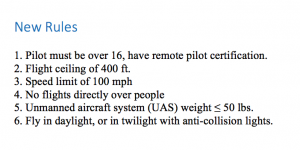The Federal Aviation Administration (FAA) has finalized the first set of operational rules for routine commercial use of drones. The new rule, which takes effect in late August, offers safety regulations for unmanned aircraft drones weighing less than 55 pounds that are conducting non-hobbyist operations.
 The person actually flying a drone must be at least 16 years old and have a remote pilot certificate with a small UAS rating, or be directly supervised by someone with such a certificate, says the FAA.
The person actually flying a drone must be at least 16 years old and have a remote pilot certificate with a small UAS rating, or be directly supervised by someone with such a certificate, says the FAA.
The new regulations require drone pilots to keep an unmanned aircraft within visual line of sight. Operations are allowed during daylight and during twilight if the drone has anti-collision lights. The new regulations also address height and speed restrictions and other operational limits, such as prohibiting flights over unprotected people on the ground who aren’t directly participating in the UAS operation.
“We are part of a new era in aviation, and the potential for unmanned aircraft will make it safer and easier to do certain jobs, gather information, and deploy disaster relief,” said U.S. Transportation Secretary Anthony Foxx.
The FAA is also offering a process to waive some restrictions if an operator proves the proposed flight will be conducted safely under a waiver. The FAA says it will make an online portal available to apply for these waivers in the months ahead.
Operators are responsible for ensuring a drone is safe before flying, but the FAA is not requiring small UAS to comply with current agency airworthiness standards or aircraft certification. Instead, the remote pilot will have to perform a preflight visual and operational check of the drones to ensure that safety-pertinent systems are functioning property. This includes checking the communications link between the control station and the UAS.
Although the new rule does not specifically deal with privacy issues in the use of drones, and the FAA does not regulate how UAS gather data on people or property, the FAA is acting to address privacy considerations in this area. The FAA says it is strongly encouraging all UAS pilots to check local and state laws before gathering information through remote sensing technology or photography.
FAA Administrator Michael Huerta says the FAA is already working on additional rules that will expand the range of drone operations.
According to industry estimates, the rule could generate more than $82 billion for the U.S. economy and create more than 100,000 new jobs over the next 10 years, according to a statement from the FAA.
[Image courtesy: FAA]